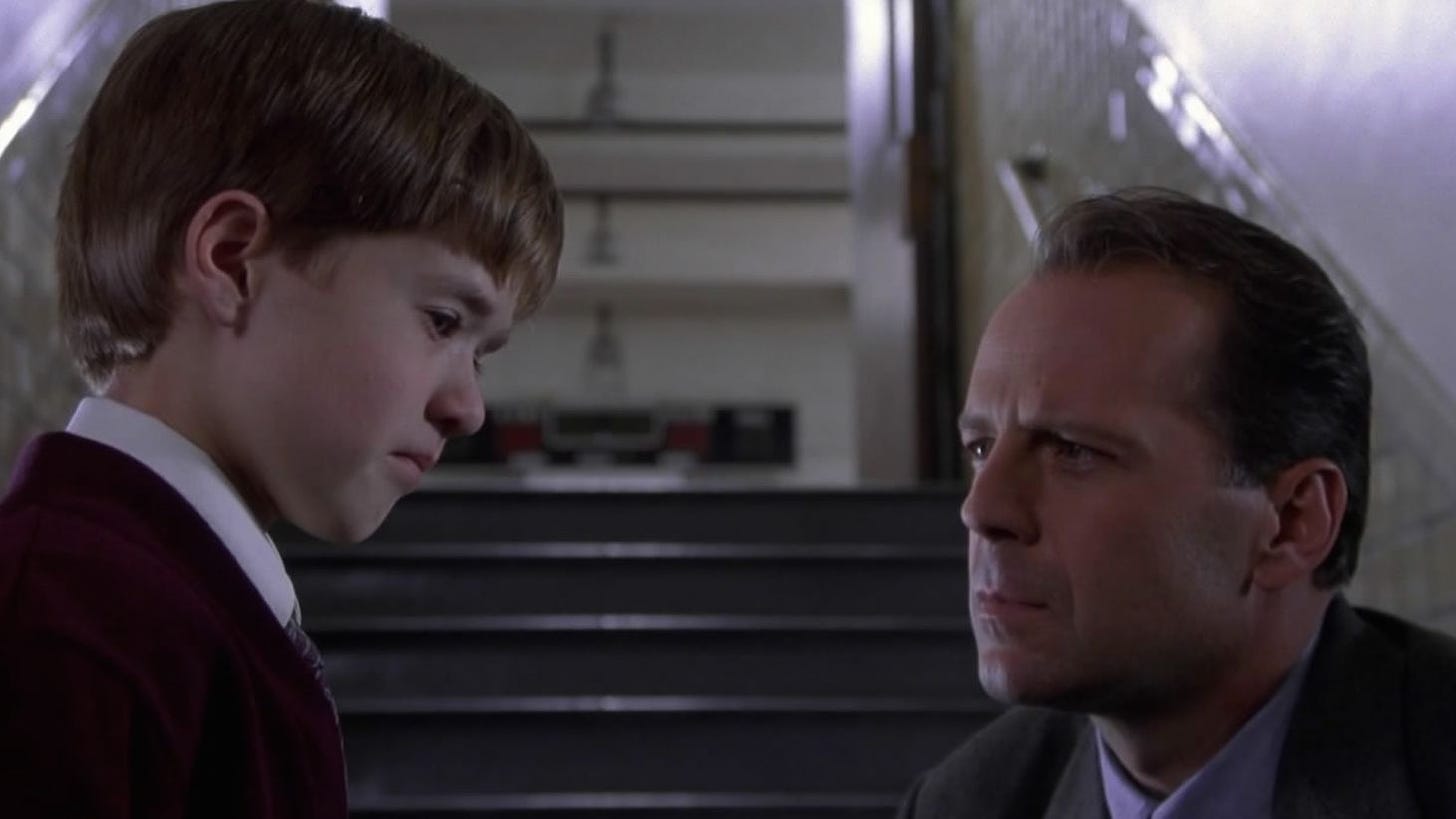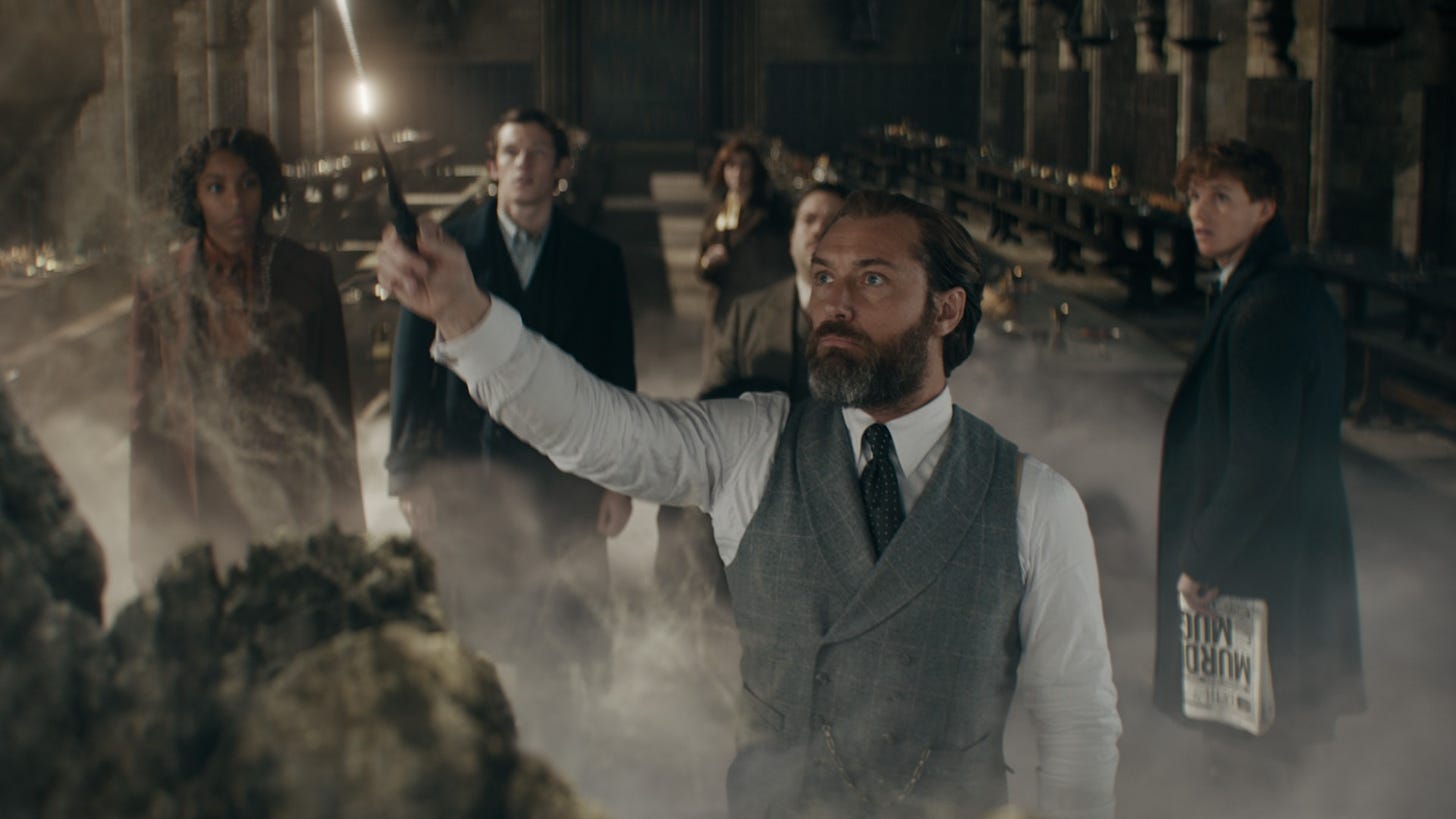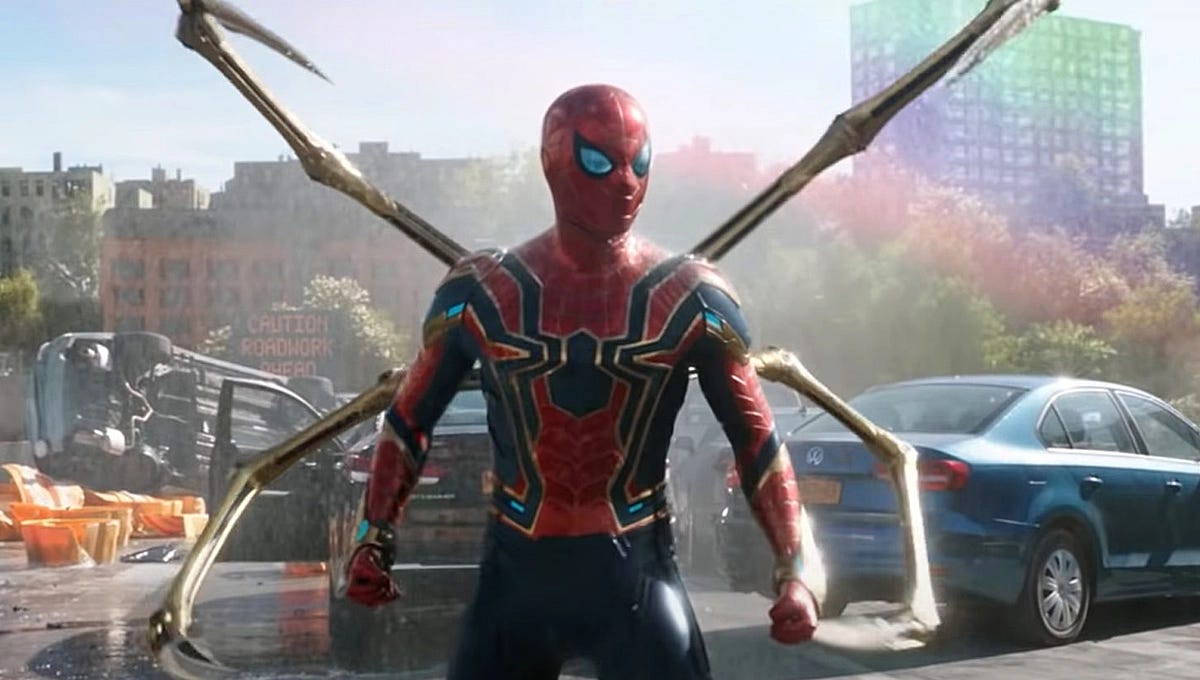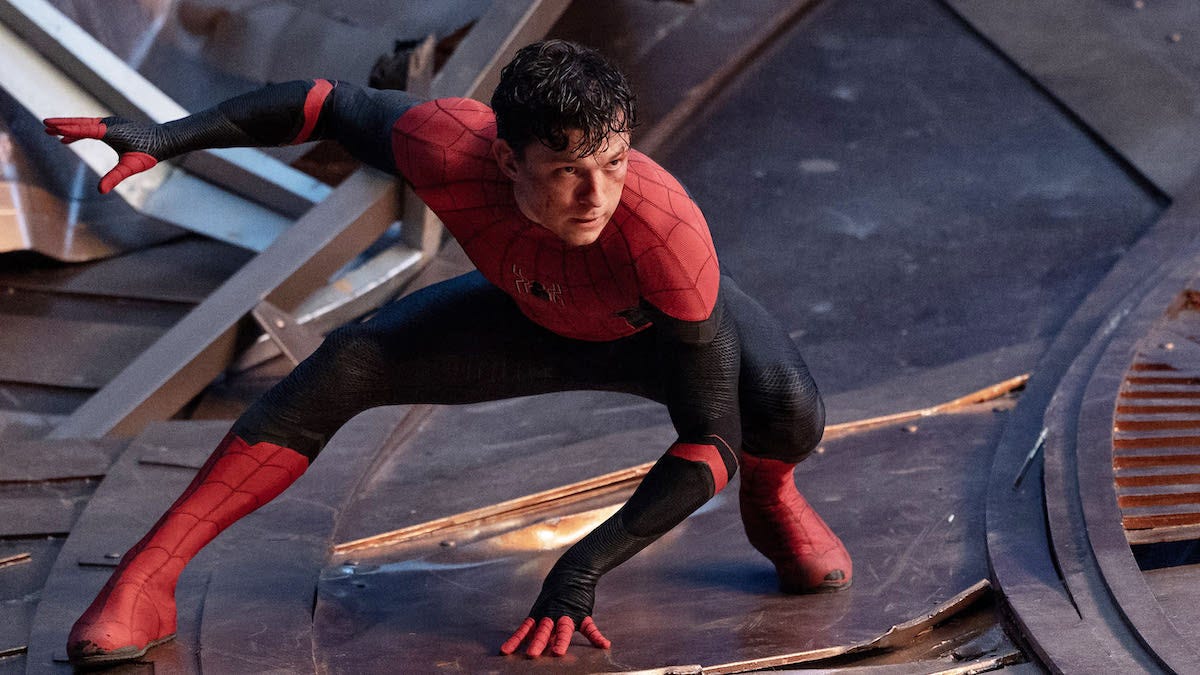[In case you couldn’t already tell from the headline, this article contains spoilers for Spider-Man: No Way Home.]
Spider-Man: No Way Home arrived on 4K and Blu-ray this past Tuesday, and I didn’t really write about the movie when it hit theaters because I had just left Collider and writing about superhero movies was officially no longer my problem. But I realized I still had things I wanted to say.
For those unfamiliar with Spider-Man: No Way Home, the plot involves Peter Parker (Tom Holland) asking Doctor Strange (Benedict Cumberbatch) to make everyone in the universe forget that he’s Spider-Man because it’s preventing his friends MJ (Zendaya) and Ned (Jacob Batalon) from getting into MIT. (You may recall from Spider-Man: Far From Home that he has been recently unmasked and accused of murdering the villainous Mysterio, Jake Gyllenhaal.)
However, when Strange’s spell backfires, it opens up the multiverse and ushers in villains from previous non-Marvel Cinematic Universe (MCU) Spider-Man movies—like Spider-Man 2’s Doctor Octopus (Alfred Molina) and The Amazing Spider-Man 2’s Electro (Jamie Foxx).
I don’t think it’s an exaggeration to say that Spider-Man: No Way Home was the most-anticipated film of 2021. After grinding through the pandemic, audiences were willing to brave the Omicron wave for it—and broadly speaking, I get that. The MCU’s Spider-Man movies are reliably entertaining, and by including the villains in the No Way Home marketing campaign, Marvel offered a tantalizing nostalgia hook to those of us that have been turning out for Spider-Man for the past two decades. To put it another way. If you were 10 years old in 2002, in 2021 you may very well have a kid of your own by now. Wouldn’t it be neat to take that kid to a movie that bridged all the Spider-Man films from your youth?
According to Tom Holland, however, this wasn’t the original plan. They were originally going to keep the villains a secret and make the film seem like a battle between Spider-Man and Doctor Strange (and the marketing still kind of shows that)—but then Molina spilled the beans by confirming a rumor about his appearance in No Way Home. Of course, in an interconnected age, trying to keep a lid on all these appearances was probably a fool’s errand, and yet Sony and Marvel were determined to keep one aspect “a secret.”
In a movie that brings in Spider-Man villains from other universes, it only stands to reason that you would also bring in the previous Spider-Men, Tobey Maguire and Andrew Garfield. And yet for over a year, we had to weather the most bald-faced denials that this was happening. The actors were filmed in secret, which meant that the entire third act had to be filmed entirely on soundstages and against green screen. Their interaction in the MCU extends only so far as each other and the other above-the-line actors. There was no chance of a random extra catching a glimpse of Maguire or Garfield back in their Spidey suits.
This was meant as a surprise, and to confirm their presence in the film would qualify as a “spoiler.” But can a surprise really be a spoiler when everyone expects it to happen?
Spoiler Alert

In the social media era, spoilers have taken an outsized role in directing conversations about movies and TV shows. Obviously, no one wants to have a major plot point told to them before they have a chance to experience it for themselves, and yet in a way, that era has already kind of ended. I went to see The Sixth Sense weeks after it had opened and had no idea about the now-famous twist ending. We now have a world where if you want to stay “spoiler-free”, you need to either stay off social media and/or see the thing as soon as possible (studios obviously prefer the latter because then you become part of the word-of-mouth campaign). And even then, you may not be “safe.” (Some guy at a baby shower told me about a major character death in Star Wars: The Force Awakens months before the film opened and I just had to roll with it).
But spoiler culture has also curtailed what can be discussed. Film reviews make a point of dancing around specific plot points, which is bad for both the film and the audience. This approach works if you only see reviews as a product review for a prospective customer, but I prefer to approach them as a discussion of the work designed to engage with people who have also seen the film—an exercise that gets hamstrung when you can’t fully go into the plot.
Basically, we’ve thrown all our energy into maintaining the “surprise” of the reveal, rather than discussing whether that reveal actually benefits the film. The best movie twists are ones that support and enrich the story as a whole. In The Sixth Sense, it’s not simply that Dr. Malcolm Crowe (Bruce Willis) has been dead for most of the movie; it’s that his inability to come to terms with his own death is a reflection of the deep grief and loss he mutually feels for his wife, Anna (Olivia Williams). When Malcolm realizes that he’s dead, it’s a catharsis that allows him to finally let go and allow Anna to let go as well. The twist leads to an emotional resolution created by the narrative as a whole, rather than a “gotcha” moment to leave people talking.
However, when there’s nonstop dialogue about that content across social media, the need to break through with some massive reveal becomes a double-edged sword. If you keep it secret, people may not show up. If you let it get out, it ceases to become a “moment” that people will talk about. The compromise is you hint that there’s going to be a massive reveal, but then you also try to get people to agree that this reveal must not be spoiled. Avengers: Endgame did this by keeping things pretty under wraps, but also issued things like the hashtag “#DontSpoilTheEndgame”. Spider-Man: No Way Home took this whole two-step further by heavily hinting at its big reveal, and then acting like this known quantity was a massive secret.
Narrative as Gift Fulfillment
I am not easy to shop for. I think it’s been over a decade that anyone has bought me a movie I didn’t specifically ask for because they likely know I’ve probably either seen it or own it already or maybe didn’t like it. Instead, I tend to provide a wish list and then people buy me things that are on the list and then I’m grateful they were kind enough to buy me a gift. I’m not “surprised” when I open a gift, but I’m excited and happy all the same because I got the thing I wanted.
Putting Tobey Maguire and Andrew Garfield’s Spider-Men into No Way Home is the cinematic equivalent of fulfilling a gift request from the fans. People wanted to see these actors reprise their role as Spider-Man. They wanted to see Maguire because he originated the role on the big screen. They wanted to see Garfield get another crack at playing Spider-Man because they liked him in the role even if they didn’t like the Amazing Spider-Man movies. They wanted to see what it would be like if all three Spider-Men were in the same movie and interacting with each other.
Screenwriter William Goldman famously wrote about Hollywood that “Nobody Knows Anything.” That was before social media and entire fandoms could tell you exactly what they wanted. For studios, this is a boon because instead of telling stories that may or may not be successful, you can simply give the audience what they’re asking for. If the fans are banging on a table like J. Jonah Jameson and shouting, “Bring me more Spider-Men!” then you will work to acquiesce to their request.
The part where it gets weird (and why I’ve been thinking about this movie for the past four months) is that the audience also demanded that the thing they wanted—all the Spider-Men together—had to remain a secret. They couldn’t be shown together in the marketing, and no one could even acknowledge that their presence in the film. Andrew Garfield did press for two movies in 2021 before No Way Home came out (The Eyes of Tammy Faye and Tick, Tick…Boom!) and in the junkets for both, he had to baldly lie and say he had no involvement in the upcoming Spider-Man movie. And if he had told the truth that he was coming back to play Spider-Man, people would have been mad at him! He would have “spoiled” the thing that everyone was expecting to happen!
As a business strategy, this is solid gold. As narrative, it’s deeply unfortunate. To return to my Sixth Sense example, no one was walking into that movie in 1999 thinking, “Bruce Willis’ character better have been dead this whole time.” No one even thought to expect it. But in 2021, fans walked into Spider-Man: No Way Home expecting Tobey Maguire and Andrew Garfield to show up, and I don’t think it’s unreasonable to assume that fans would have been fuming if those actors hadn’t been in the movie. They went to the movies to be satisfied, but with the illusion of a surprise. No Way Home “delivers” insofar as it is the pinnacle of fan service in a major motion picture.
No Direction Home
The problem, however, is that it robs No Way Home of much of a story arc for Tom Holland’s Peter Parker, who is ostensibly the protagonist. Again, if the point of your movie is “We brought three live-action Spider-Men together” and you accomplish that, where does that leave the rest of the story? What is this movie about other than seeing three different actors who played the same character share the same frame? I genuinely don’t know what Peter’s arc is supposed to be in this movie because the shape of the movie keeps changing.
Strange tells Peter that all this chaos is the consequence of him trying to live two different lives, but is No Way Home really about alter-egos? The first half of the film would suggest so with Peter wishing he had his anonymity back, especially after people believe he murdered Mysterio. But bringing in other Spider-Men doesn’t resolve this conflict. Instead, they’re part of a different story about grief and reconciliation. The other Spider-Men arrive after Aunt May (Marisa Tomei) dies, uttering the famous “With great power comes great responsibility” as her last words. No Way Home then tries to tie these both together by arguing that Peter’s “great responsibility” is to accept that everyone must forget him, thus creating an extreme consequence of his desire for anonymity.
It works in the same way as wrapping enough duct tape around something that’s broken “works.” You have to ignore a lot—like Peter already having learned the “great responsibility” lesson multiple times already,1 or that the Mysterio backlash mysteriously disappears after the first act, or that the reason these villains die in previous Spider-Man movies is because it adds pathos to Peter’s hard-won discovery that he can’t save everyone.
The big message of Sam Raimi’s Spider-Man 2 is that “Sometimes to do what’s right, we have to give up what we want. Even our dreams.” The completion of Doc Ock’s arc is when he overcomes his desires and gives up his life to save the city. Now imagine if that movie had ended with, “Hey! I found a magic solution to make you good again! Voila!” It would undermine the film’s theme about sacrifice.
Peter does make a powerful sacrifice in No Way Home in that everyone, including the people he loves, forgets he exists, but this resolution doesn’t really require the presence the other two Peters. Those characters are there to show the familiarity of Peter’s grief and to stop him from giving in to his hatred against Green Goblin (Willem Dafoe), but ultimately they don’t factor into his choice to make everyone in the universe forget that he exists. Furthermore, if this is a story about alter egos, like the first half of the film suggests, then its resolution is “cast a magic spell so everyone else has to change, but you can go back to being Spider-Man in secret,” doesn’t really solve the alter-egos conflict for Peter as much as it simply undoes it for an unknown amount of time.2
Instead of getting a story that challenges us or forces us to rethink characters in a new way, No Way Home is bent on giving the audience exactly what they want. But storytelling that endures and enriches is about giving people what they need, not necessarily what they think they want. It’s not that it’s impossible to tell a story where you bring in previous Spider-Men, but because the filmmakers were also trying to meet the requirement of a “reveal”, they maintained the fake surprise at the expense of the storytelling. Instead of getting a good movie, you get a memorable moment, but one divorced from a larger story.
I don’t want to go down the “slippery slope” argument, but the success of No Way Home doesn’t bode well for blockbuster cinema. Although I expect studios to do whatever they can to make as much money as possible, I’m disheartened that fans should be so appreciative at the thin gruel of fan service when it costs them a good story.
Capsule Review
Fantastic Beasts: The Secrets of Dumbledore

[Disclaimer: I’m a Warner Bros. Discovery employee, and this is a Warner Bros. Discovery movie.]
On paper, Fantastic Beasts seems like a reasonable idea, or at least it seemed like one in 2013 when the project was launched. Almost ten years later, it will go down as a bizarre curiosity for only the most die-hard Harry Potter fans. Even setting aside the scandals surrounding screenwriter J.K. Rowling and actors Johnny Depp and Ezra Miller, there never was much of a story to build upon here.
Harry Potter is a masterclass in world-building. Rowling seemed to think that what audiences wanted was more world-building, so there needed to be a vehicle that would take them to a different time (the series begins in 1926) and place (the first film is set in New York City). But the reason people ultimately connect with Harry Potter is the characters, and Rowling never really built that in this new universe. Newt Scamander (Eddie Redmayne) is the same at the start of this trilogy as he is at the end, and the reliance on the Dumbledore (Jude Law)/Grindelwald (Depp and replaced in the third installment by the far superior Mads Mikkelsen) conflict shows difficulty in building new characters and new relationships.
Secrets of Dumbledore is like watching someone try to untangle Christmas lights. The previous installment, Crimes of Grindelwald, put the series in such a deep hole, that Secrets feels like both a course correction and a rushed resolution. It’s slightly better than Crimes, but not by much. More than anything, it serves as an admission that Fantastic Beasts was not the right follow-up to the Harry Potter film franchise and even if multiple members of its production hadn’t been marred in scandal, the story still would have trouble hooking audiences.
There were supposed to be five Fantastic Beasts movies, but Secrets of Dumbledore ends in such a way that it could really be the completion of this series. I understand why Time Warner (that’s right: two companies ago) green-lit five movies, especially in an age where other studios saw Disney announce a glut of IP-driven franchises and feel like they need to catch up, but even Harry Potter isn’t indefatigable. I’m sure the Wizarding World will carry on in one form or another (if I had to guess—and it’s only a guess—it will likely re-emerge as an HBO Max series), but for now, I think everyone is eager to close this troubled chapter of the series.
When Peter first meets Tony Stark (Robert Downey Jr.) in Captain America: Civil War, he tells a story that implies he’s learned about the responsibility of stopping bad things from happening when you have the power to do so. You could also argue that responsibility factors into the conclusions of Homecoming and Far From Home.
The film also has to end awkwardly because of the tortured relationship between Sony and Marvel over Spider-Man. Briefly, to get Tom Holland to play Spider-Man again, they’ll have to renegotiate his contract, and Sony also wants Spider-Man to interact with non-MCU characters like Venom (Tom Hardy) and Morbius (Jared Leto). But that’s an issue about two major studios trying to share a major franchise.





